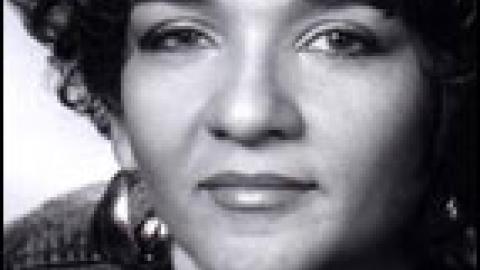
A Ronette Encounters a Big God
Craig von Buseck: You were incredibly successful with the Ronettes, then something happened and you gave it all up. Tell us about that time in your life.
Nedra Talley-Ross: The Ronettes started when I was 14-years-old. We are all family -- our mothers are sisters. We've always been together, always singing. It was a very family-oriented situation where Saturday nights were aunts, uncles, and cousins all at my Grandmother's home. I came from a Baptist home. We went to church twice on Sunday.
My Grandma died just before I turned 14, and it was a big hit to our family because she really was that anchor. We had her funeral at the church that we belonged to, and literally we could not go back because there were too many memories. We were so in love with my Grandma that to go to the church was going to see where she was buried. So here I was at 14 and going to church was not quite what it had been.
So we were singing and beginning to see certain sides of the world, but still very family-oriented. So there was this control on what was going on in our lives. My Mom, Susan Talley, was out there and beginning to knock on doors saying, "There is a group here." We were taking three-part harmony lessons, learning to blend. There was that family sound.
All these things were working, and so by the time I was 15 we had our first New York City hit. When you're a hit in New York City, that's still pretty big, enough of a hit so that we were doing the sock hops and the amusement parks in New York. By the time I was 17, and I was the youngest in the group, we had our first mega-hit with Phillies Record, for Phil Spector. So that took us to a whole other level, from being a New York City, East Coast girl group, to going across the United States, and then international. 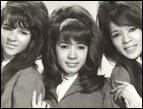
So at 17 I was going to Europe -- I turned 18 in England as we were performing. So there was a side where you had a life that most teenagers would never have. I would perform on the weekends and then go to school on Mondays. There I was having all of this handed to me. We were that girl group that danced, we sang, we looked alike -- we developed the whole thing of the bee-hive hairdo look and the make-up. So we were making a statement that we weren't even thinking about. We were just being who we were.
It was multi-cultural -- you weren't white, you weren't black. The Ronettes were different. A lot of young girls were looking at who we were. We were an example to a lot of girls of the look that they wanted. And then the young boys were falling in love with the Ronettes.
So we had it all -- everything in the natural that somebody would say, "This is it." We reached the top at a very young age.
Thank God for our family. When we toured we were with either my Mother, or one of my Aunts. We had plenty of chaperones. So we were out there, but we were not out there. We could have gone over the edge in so many ways and didn't because we had family traveling with us.
von Buseck: There are so many of those rock-and-roll tragedies that you hear of, but you avoided that.
Talley-Ross: Uh-huh. The drugs were there. Thank God, they didn't affect us at all.
von Buseck: So all of that was available to you?
Talley-Ross: It was available, but like I said, we had people with us. So it wasn't like you could get alone in a situation where someone would sell you this stuff. When we toured, it was with family. And so an uncle is not going to let you get in trouble, unlike someone who was just there for a job.
von Buseck: And then they look to please you if they're not a family member. They say, "I want to please you so that the pay check keeps coming."
Talley-Ross: Exactly. I'm very family-oriented myself. I would go on the road, but the goal was when I went home, I went home. It was back to normal. I had money there, so I had someone to help me clean. But my Mother kept me in reality by making me clean my own room.
von Buseck: Go Mom!
Talley-Ross: So we avoided a lot of the pitfalls. And they are out there. If you have money, then people are there to see how they can get that money.
Then you had record companies that worked their people, and kept them on the road. So they were constantly on these "Cavalcade of Star" tours. The record company was getting all the benefits from it. They made them, they paid for them, and they kept them out there. So they were being worn down and the people around you would, in the long run, take you out. So thank God we didn't have that.
But when I would perform it was all the whistles, it was the lights, it was the fame. My personality is pretty easy-going. So if somebody came to see us, I always felt a responsibility to sign autographs. But there was this other side where I thought, "I'm signing autographs, and people think that this is it." People want to know you. They want to touch you. They want a piece of you. And you're giving yourself because you think, "You like me, so I feel like I need to be what I need to be to you." But I would look at it and think, "There is more than this."
I was at a point, just before I turned 21, where I had gone with my husband, Scott Ross, to visit his Mother in Maryland. When we arrived she told us, "I want you to go to church with me." And there I go, being the nice girl again; I said to Scott, "We're going to church."
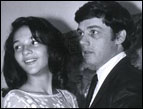 Scott told me, "I'm not going to church -- been there, done that. I don't want anything to do with it."
Scott told me, "I'm not going to church -- been there, done that. I don't want anything to do with it."
But being the nice Baptist girl that I was, deep down inside I said, "This is what we're doing," never expecting that I would be confronted with who the Lord was. I had no idea.
So we were sitting there in this Pentecostal church, and you have to remember that I was a little New York City Baptist girl in Maryland. And this preacher, in the natural sense, he was just as dorky and corny as they came. He was half-blind, so he had on mismatched socks. So I'm "miss fashion statement" from New York and here we were -- Scott with his trench coat and his dark glasses -- we had the looking going on. But this preacher was saying words that were just absolutely hitting my heart.
Then there was this prophetic word -- this Baptist girl had never heard a prophetic word before in my life. But the word said that there were two people there, and that God knew who we were and knew what we had. It was our time. So I looked at Scott and said, "That's us." Scott replied, "I don't want to hear it." So I said, "O.K., well I know it's me, anyway."
I didn't even know to go forward. But something inside of my heart was saying, "I need to go to the front of the church."
von Buseck: Wow. Isn't that amazing?
Talley-Ross: I need to go to the front of the church and get on my knees and ask God to forgive me. And so I stood up and I had to go past Scott. And the Holy Spirit said to Scott, "You know the truth. You know it's the two of you." So I stepped out into the aisle. Scott stepped out into the aisle. I walked forward and I just remember hitting my knees and saying, "God, you care about me, and this is my time." And even though there were many things that I didn't do wrong, there were also things that I did do wrong, and I knew in my heart that I had strayed from the truth that I had been raised with.
I remember looking to the left of the church and there was this blackboard that I saw in the sky, but it was near the hymnal sign in the church. You know when you're in school and the teacher writes on the blackboard, and then she erases it, but you can still see the chalk, even though the writing is gone. And I knew that God had cleared all of my sins.
von Buseck: So this was a vision?
Talley-Ross: It was a vision that I saw.
von Buseck: And it was right there at that moment when you went forward?
Talley-Ross: Right there, down on my knees, and I looked up to my left and I saw this blackboard, not even knowing that there was Scriptures to back up that He erases our sins. I didn't know it. I just saw it.
von Buseck: Awesome.
Talley-Ross: All of a sudden, the whole church was behind us, praying for us. So there were these two people…
von Buseck: …responding to the prophetic word.
Talley-Ross: And of course, there was Scott's Mom, and what a great honor it was for her to be alive to see that moment, because Scott was a preacher's kid. So he knew the truth, being raised in that charismatic world, even more than certain sides of me. So I knew that my life had changed. We were confronted with who the Lord is -- it wasn't mean, or "you’re a rebel, or you're this, or you're that." It was like, "I know who you are, I love you, and your sins are forgiven. Even though you think you're nice, and even though you've acted very nice, you're a sinner and you need to be saved."
So I realized that God is bigger than my career, the applause, and the money. Something inside of me said, "This is the big one!" It was exactly that. I knew there was a big God.
von Buseck: So this takes place, and then you went back to New York. What happened next?
Talley-Ross: It was so crazy, because we were there in Maryland for just a few days. We were at that Sunday night meeting, and then the next day we met with the preacher and said, "Tell us what's going on." So we just drew from him just for a few days where he shared from the Word and who the Lord is. We felt such a connection to him, because when someone brings you life, you're attached to them. There is this burning inside of you to know the truth. We wanted to know about the words of life that he had given us.
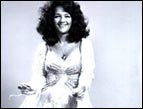 We went back to New York City and I told my family that I had this encounter. I basically got, "Listen, we have invested in a career for you for many, many years. A lot of people have invested their lives into you. You've always been a part of the church. What are you saying?"
We went back to New York City and I told my family that I had this encounter. I basically got, "Listen, we have invested in a career for you for many, many years. A lot of people have invested their lives into you. You've always been a part of the church. What are you saying?"
It was like, "She's crazy. Maybe she's done some drugs and we just don't know about it. She'll get over this. This will stop. You're just going through something right now."
But we went back to New York City and I remember that all of a sudden the sky was bluer. There was a clarity and a purpose that we had. It was like nobody was going to understand what we were talking about, because we didn't totally understand what was going on in ourselves. But we knew that we had encountered the Lord.
So we had all the show business people to deal with, and all of my family to deal with -- and I've got tons of family. And they were saying, "If you just stop this you'll be better."
Then there was the other side of it. In 1966 there was nobody in the rock and roll world who was talking about Jesus. Today you are constantly hearing that this one knows the Lord, or that one knows the Lord. So I went back and found nobody who would stand with me as another Christian in the music business. There were none. Nobody was making Christian music. No one was saying, "I want to sing for the Lord."
So it was like I was just out there very much by myself.
I had some contracts ahead of me, and one of them was to do a tour and a New Year's Eve show in Germany. So we were on tour and I remember there was this very good looking guy on the tour bus, and I began to tell him about my experience with the Lord and what happened to me. He looked me in the eyes. He had very pretty eyes -- blond guy, blue-eyes -- and he smiled so nice to me. He listened to what I had to say, and he said, "If you give me two weeks, you'll deny everything you believe." And I thought, "Oh, my goodness, the gauntlet was thrown down." The challenge was there. You remember that song, "The devil comes in blue jeans." It was a very beautiful person with a very ugly statement.
It was so scary, because I knew it was the truth. I knew that if I tried to walk and grow where there was no fertile ground, in a short period of time it would be gone. I knew that there would be a lot of good looking guys to come and go, saying, "Just give me a chance." Or girls who would say, "You know, this is really the truth. What you've got right now is not the truth." And something in my heart said, "O.K., make your choice. I need to grow, and I can't grow here."
So it was a little bit difficult as far as the Ronettes were concerned. But we were all sort of at that point in our lives, because when you start at 14 years old, by the time you're 21, you've been out there for awhile.
von Buseck: That's a career for many people.
Talley-Ross: Yeah, right. It's a career. So there was a side of me that was family-oriented in those days. I look back on many of the interviews during the Ronette days and they would ask, "What do you want to be." I'd answer, "I want to be a wife. I want to be a mother. I want to be a grandmother." I was talking about these things when I was 20-years-old. It was just in my nature, and what God wanted me to be -- what I was made to be.
So I said, "O.K. girls, we can keep going, but this has happened to me." They couldn't really see and understand where my stand was. So we agreed to finish out our contracts and dissolve the group. My cousin Veronica was dating our producer, and she had hopes to marry him. For my cousin Estelle it was a little bit different because she didn't have someone she wanted to marry. So it was more difficult to walk away.
So we agreed to disband.
von Buseck: So were you and Scott married at the time?
Talley-Ross: No, we got married three months after that. We had dated for two years. We had a couple of break-ups in that time -- we don't agree with the order of it (laughs).
von Buseck: I can only imagine (laughs).
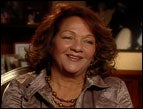 Talley-Ross: He was more of a rascal than I thought he was (laughs). But we knew that we needed to walk it straight and to not live the lifestyle that we had before -- that we needed to marry and give our lives to the Lord. And we totally had faith that God was there in it, and that the end result was in His hands. So we were married, left New York City, and went back to Maryland to that small church to get that foundation that we needed.
Talley-Ross: He was more of a rascal than I thought he was (laughs). But we knew that we needed to walk it straight and to not live the lifestyle that we had before -- that we needed to marry and give our lives to the Lord. And we totally had faith that God was there in it, and that the end result was in His hands. So we were married, left New York City, and went back to Maryland to that small church to get that foundation that we needed.
von Buseck: That's amazing.
Talley-Ross: Eventually we moved to Virginia to join Pat Robertson. We had a choice of working with David Wilkerson or Pat Robertson. We came to CBN and I never told Pat who I was. He had no idea. Pat did the interview with me after the Rock and Roll Hall of Fame induction and he said, "You never told me how famous you were." It wasn't really necessary. I just wanted to be whatever God wanted me to be.




